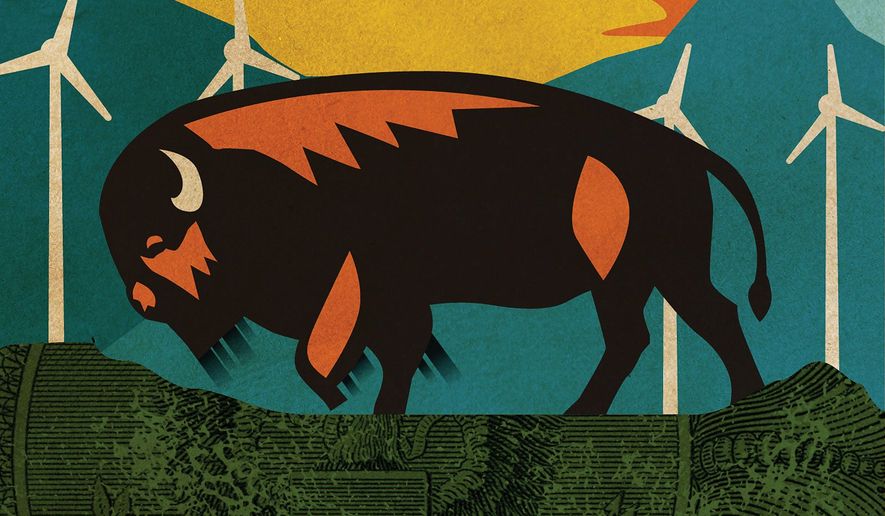OPINION:
Deb Haaland has faced pointed questions in her confirmation hearings and has been evasive in her answers. Not surprisingly, resistance to Ms. Haaland’s confirmation has led supporters to call the opposition, “racist,” based on her American Indian heritage.
It is a tribute to our republic that we have elected African Americans, Native Americans, Hispanics and countless other minority leaders. Having done so, does not mean we should hold them any less accountable for the responsibilities entrusted to them. To do otherwise would be racist.
Ms. Haaland has been entrusted with managing the Department of Interior (DOI), which is the largest landowner in the United States. It holds title to half-billion acres, including national parks, national monuments, timber grazing lands and fossil fuel reserves. As the Bureau of Land Management’s motto puts it, these are “lands of many uses.”
Included in the DOI land holding are more than 50 million acres of Indian country overseen by the Bureau of Indian Affairs (BIA). As a Native American, Secretary Designate Haaland has a real opportunity to make changes in the BIA’s hold over Indian lands which one Indian leader refers to as “white tape.” Another says the acronym means “Bossing Indians Around.”
Her support of the Green New Deal, however, does not bode well for Indian country or the Western states, generally. Ms. Haaland has said she would “stop all oil and gas leasing on federal lands,” support “a ban on fracking” and call for “No new pipelines.”
When confronted with these positions by Sen. Steve Daines, Montana Republican, Ms. Haaland kept saying “it is President Biden’s agenda, not my own agenda, that I would be moving forward.” It is such evasive answers that cause Sen. John Barrasso, Wyoming Republican, to uncharacteristically interrupt Ms. Haaland and insist on “straight answers.”
Moving Mr. Biden’s agenda forward will have a big effect on reservations, especially those with significant energy potential. On the one hand, Mr. Biden’s freeze on oil and gas leasing on federal lands, shook the Ute Tribe, which has gotten sovereignty “one barrel at a time.” Because the BIA controls so much reservation land, the tribe feared the ban might apply to it. Fortunately, Mr. Biden responded quickly saying tribes were exempted from the freeze. Hopefully, this decision will hold under the leadership of Ms. Haaland, despite her call for stopping all oil and gas drilling.
On the positive side, Ms. Haaland’s Green New Deal will provide massive subsidies to wind and solar energy, both of which are in abundant supply on many reservations. According to a 2018 study by the National Renewable Energy Laboratory, tribal lands have 5% of the nation’s potential for generating solar energy and nearly 9% of the potential for wind energy.
In the past, the BIA and other federal agencies had been a roadblock for energy development on reservations. For example, when the Assinboine and Sioux Tribes wanted to develop their oil and gas on the Fort Peck Reservation in Montana, they had to conduct archeological reviews, which delayed development. In response to those reviews, tribal councilman Stoney Anketell responded that “land has been farmed for 70 years? It’s been tilled, plowed, planted, harvested. There’s no teepee rings.” Will Ms. Haaland unwrap such “white tape?”
If Secretary Haaland wants to lift Native Americans, the nation’s poorest minority, out of poverty, she won’t do it by painting herself a darker shade of green. To be sure, American Indians have cultures built on their respect for Mother Earth, and tribes know who to manage the resources on their reservations. They don’t need Ms. Haaland or the BIA to boss them around because they aren’t considered “competent and capable” under antiquated laws.
What they need from Ms. Haaland is a chance to free themselves from dependency on the federal government. The Ute Tribe in Colorado has loosened that stranglehold by capitalizing on its abundant oil and gas resources that are worth $4 billion, making each of the 1,400 tribal members a millionaire. They don’t need a Green New Deal.
As Bill Yellowtail, a regional director of the EPA for President Obama, put it, “Dependency has become the reality of our daily existence. Worst of all, generation by generation it becomes what sociologists term learned helplessness — an internalized sense of no personal possibility, transmitted hereditarily and reinforced by recurring circumstances of hopelessness.”
If the Biden administration is to right the long-running injustices toward indigenous people, it won’t do so by having an American Indian bossing American Indians around. It will do so by having strong leadership at the Department of Interior that fosters and encourages tribal sovereignty. Ms. Haaland is in a good position to be that leader if only she builds on her heritage rather than riding on the administration’s green policies.
• Terry L. Anderson is a senior fellow at the Hoover Institution.




Please read our comment policy before commenting.